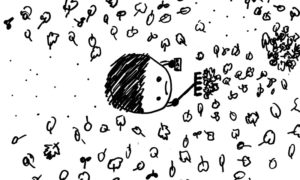
We’re trying to find the most efficient way to rake leaves over an infinite plane. The simple answer is to rake in a straight line. But how frequently should you bag the leaves? Well, the amount of seconds per leaf unit picked up is proportional to the number of leaves you already have. Let the number of leaf units per bag be l, and the average seconds per leaf unit, a. Your rake has a length of 0.5 metres, so you must walk 2 metres. That means the a is 2, when l is 0. This is when we bag every zero seconds. But at that point, the time required to bag them is undefined. The limit, however, as leaf units per bag decreases, is infinite. The average time spent pushing leaves per leaf unit increases by one second per 20 leaves, so the number of seconds spent pushing the leaves is dictated by the first equation below. Now, 1 bag takes 2 seconds plus 1 second per five leaf units. Divide this by the number of leaf units to get the seconds per leaf unit. Multiply the top and bottom by 5 to simplify. Separate the l to get the second equation below. The first equation is linear and increasing. The second is hyperbolic and decreasing. The total is concave up. What is it’s minimum? The minimum is the point at which the slope is zero. The derivative of the first equation is a constant twentieth. What is the derivative of 2/l? Remember, 2/l = 2l-1. The exponent rule says it’s derivative is -2l-2. At the minimum, this plus a twentieth equals zero. Solve for l to get √10. Divide by 2 and get the optimal strategy. Rake in a straight line and bag the leaves every ≈1.581 metres. It takes only ≈0.7906 seconds to bag a square metre of leaves!
a_p=2+{l\over20}\\[8pt] a_b=\frac2l+0.2\\[8pt] a=2.2+{l\over20}+\frac2l\\[16pt] {\delta\over\delta l}\bigg(\frac2l\bigg)=-2l^{-2}\\[8pt] 2l^{-2}=\frac1{20}\\[8pt] l^2=10\\[8pt] l=\sqrt{10}\approx 3.162\\[8pt] a={\sqrt{10}\over4}\approx 0.7906